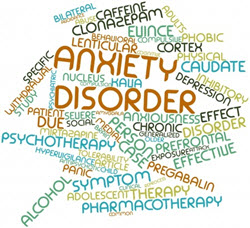The benzodiazepines have been the mainstay of anxiety management for several decades now. In the past decade or two, the antidepressants, particularly the serotonin agents, have entered the picture when it comes to managing anxiety pharmacologically. Both benzodiazepines and contemporary antidepressants are FDA-approved for anxiety treatment and are most often employed in the “worried-well” with often vague symptoms of anxiety that fall into the generalized type.
The new kid on the block for anxiety management is the second-generation antipsychotic category; and even newer still, the anticonvulsants. Use of these agents for anxiety symptoms has been trending for some time now, so let’s pick them apart a bit and see how they’re doing.
 As for the atypical antipsychotics, the best of the lot is Seroquel in the XR formulation, 50 or 150mg per day. Seroquel XR’s efficacy is most likely related to its strong antihistamine properties. Although the studies on Seroquel were industry-funded, the numbers were impressive when compared to placebo as well as to the SSRIs Lexapro and Paxil. But despite these positive findings, Seroquel XR has not yet garnered FDA approval for generalized anxiety disorder. Why? Because of safety factors primarily. This drug requires closer monitoring because of metabolic side effects such as elevated blood sugar, cholesterol and lipid levels.
As for the atypical antipsychotics, the best of the lot is Seroquel in the XR formulation, 50 or 150mg per day. Seroquel XR’s efficacy is most likely related to its strong antihistamine properties. Although the studies on Seroquel were industry-funded, the numbers were impressive when compared to placebo as well as to the SSRIs Lexapro and Paxil. But despite these positive findings, Seroquel XR has not yet garnered FDA approval for generalized anxiety disorder. Why? Because of safety factors primarily. This drug requires closer monitoring because of metabolic side effects such as elevated blood sugar, cholesterol and lipid levels.
As for other atypical antipsychotics, Risperdal was no more effective than placebo and Zyprexa use as an anxiolytic was plagued by weight gain issues. The rest of the bunch in this category (Geodon, Invega, Abilify, Fanapt, Latuda, Saphris) don’t even land an honorable mention.
On to the anticonvulsants. All anticonvulsants exert their therapeutic action by curtailing excessive neuron activation so their use in anxiety treatment seems logical. That said, only one agent out of a dozen or so shows any benefit for anxiety in randomized trials – and that would be Lyrica, which at doses of 300-600mg per day, can reduce GAD symptoms. Lyrica also holds its own when compared to the benzodiazepines Ativan and Xanax as well as the SNRI antidepressant Effexor. Despite its apparent effectiveness, Lyrica is linked to an elevated, dose-dependent risk of sleepiness, dizziness and weight gain. Thus, it continues to be rejected by the FDA for the treatment of generalized anxiety disorder.
So what to make of this? Well, when it comes to managing anxiety pharmacologically, the more things change the more they seem to stay the same, because the atypical antipsychotics and the anticonvulsants face more headwinds from a safety perspective. Though effective, Seroquel XR and Lyrica tote along baggage which the benzodiazepines and serotonin antidepressants don’t. This baggage weighs down the user of these drugs such that the FDA is erring on the side of caution – particularly for long-term devotees to these drugs.
The bigger issue here is getting a piece of the treatment pie. Getting more approvals translates into more indications for use, which can mean BIG bucks for manufacturers. And what do these companies know only so well? Anxiety is a nuisance for people at its least, and immobilizing and paralyzing at its worst. And most of those with anxiety-related problems would just as soon have the pill do the work, in spite of the fact that every agent employed as an anxiolytic merely ameliorates the excitability factor, thus providing only short-term relief. Medication numbs symptoms, it doesn’t extinguish them. Improvement requires a close examination of the situation-thought-threat-anxiety-fear continuum. But this takes work, which delays gratification. Drug companies know this too.
Attribution Statement:
Joe Wegmann is a licensed pharmacist & clinical social worker has presented psychopharmacology seminars to over 10,000 healthcare professionals in 46 states, and maintains an active psychotherapy practice specializing in the treatment of depression and anxiety. He is the author of Psychopharmacology: Straight Talk on Mental Health Medications, published by PESI, Inc.
To learn more about Joe’s programs, visit the Programs section of this website or contribute a question for Joe to answer in a future article: joe@thepharmatherapist.com.